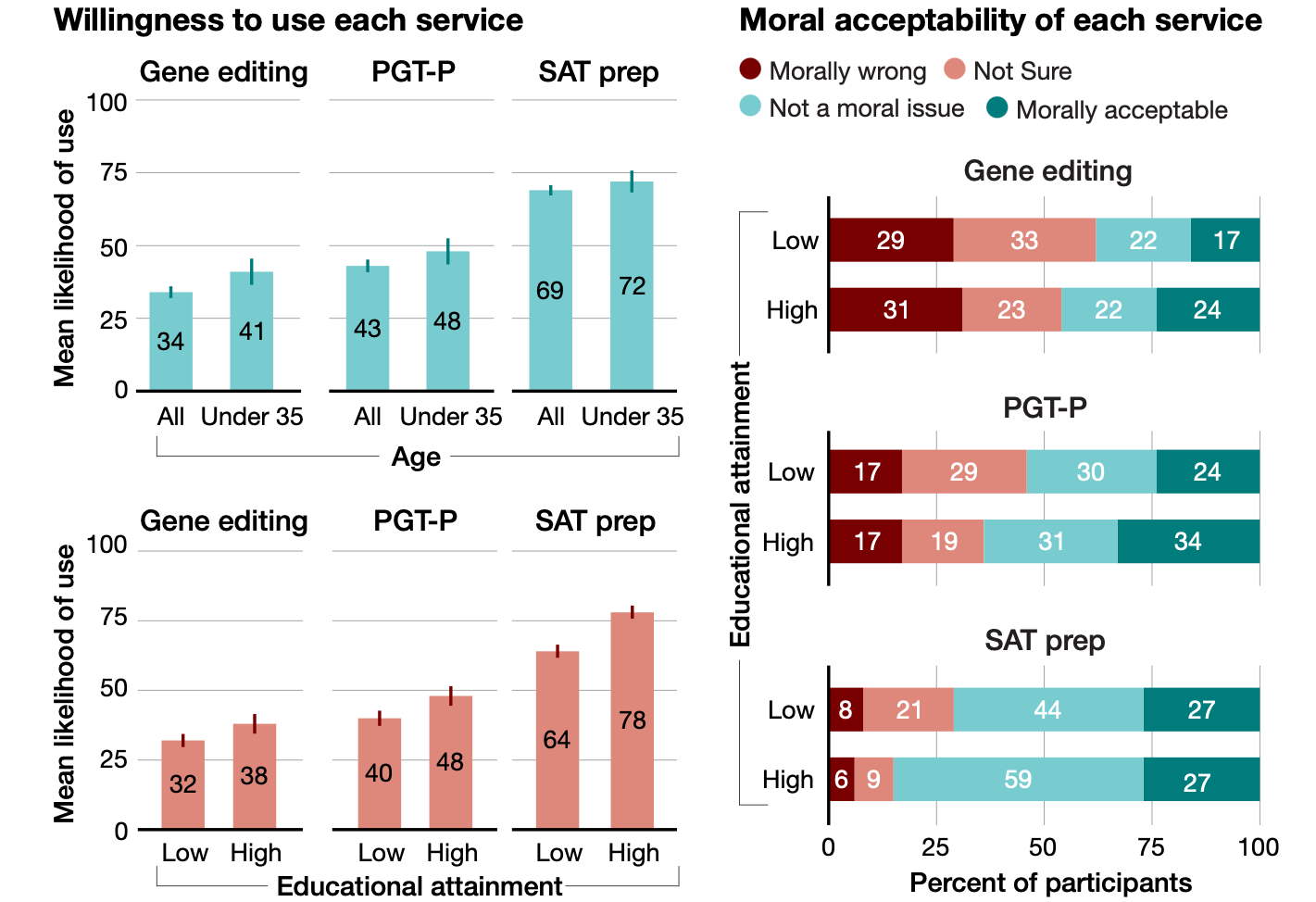A new article on the public’s attitudes toward embryo selection has been published by Michelle N. Meyer, Tammy Tan, Daniel J. Benjamin, David Laibson, and Patrick Turley. For those unfamiliar, PGT-P is preimplantation genetic testing for polygenic traits. Genome-wide association studies (GWAS) have allowed geneticists to associate single nucleotide polymorphisms (SNPs) with genetically influenced physical and behavioral outcomes. Aggregating over a person’s genome can give an estimate of risk called a polygenic score (PGS). During IVF, embryos can be biopsied and genotyped. Using PGSs to aid embryo selection is PGT-P. One of the few companies providing this service, Genomic Prediction, uses PGSs created from newer machine learning methods to get an overall embryo health score. This gives parents the knowledge to have the healthiest child they can from available embryos.
While health is undoubtedly important, many people are interested in the other possible uses of this technology, such as influencing psychological traits. In my view, cognitive and moral enhancement will be incredibly important for improving humanity’s long-term future. A significant concern is that discussions of genetics and psychology are rather stigmatized and talking about improving genes reminds many of unsavory eugenic practices. Public support is a major concern. I’ve written articles about rhetorical strategies to defend these practices (e.g. Harmless Eugenics, Making Cognitive Enhancement Palatable). This study did not ask about cognitive enhancement directly but asked about elite college admission.
In January 2022, we conducted a preregistered, nationally representative US survey-based experiment on the attitudes of 6823 people towards three services: PGT-P, gene editing, and—as a nongenetic benchmark for attitudes toward interventions targeted at college admissions—courses to prepare for the SAT test (effective N after applying weights, 3805; see table S1 for sample characteristics). We randomized participants to answer two questions, in randomized order, about one of these three services. One question asked whether the respondent views the service as morally acceptable, morally wrong, or not a moral issue; participants could also indicate whether they were unsure. For this question, both PGT-P and gene editing were described as being potentially used for “medical and nonmedical traits.”
The other question measured willingness to use each service by asking partici- pants how likely it was—on a scale from 0 to 100%—that they would use the service to increase the odds that their offspring will attend a top-100 college by selecting for genetic variants, or enrolling their child in courses, associated with higher educational attainment. We asked participants to assume that each service was free. We also asked them to assume a realistic effect size: We told them that about 3% of high school seniors attend a top-100 ranked college, and that each service would raise their likelihood of having such a child by two percentage points (from 3 to 5%). In the cases of gene editing and PGT-P, we asked them to assume that they were already using IVF and that the add-on service was safe. Fi- nally, we further randomized participants within each “service condition” to be told that it was used on average by either “1 out of every 10” or “9 out of every 10” similarly situated people (for the PGT-P and gene editing arms, “people currently having babies”; for the SAT prep arm, “people who currently have high-school–age children”).
The full article “Public views on polygenic screening of embryos” is available from Gwern, of course. The supplemental materials are available for download from Science. They go into much more detail than the article, which provides some context and discussion. I have attached the supplemental materials as PDF. The infographic below provides the main findings. The acceptability of PGT-P and gene editing pleasantly surprises me. I wonder whether people would feel similarly if the question was about increasing IQ. Most would probably accept it for health.




Everybody underestimates the average patient. Just read the comments under any normal media piece on the subject. Or look at the study GP did of patient attitudes: https://rucore.libraries.rutgers.edu/rutgers-lib/67610/
It was the same back in the day with IVF.
To make positive media about PGT-P, just 1) interview patients 2) say no to IQ-hating journalists.
This makes me think of a comment by Simone Collins:
> I think the sad thing about this tech is that media framing it in a positive light gets relatively zero attention in comparison to media that frames it as controversial, evil, creepy, elitist, what have you, which inspires PLENTY of attention. For better or for worse, controversy sells in today's markets.
To which I replied the following:
Not true at all.
This is the media piece that got the most attention:
https://twitter.com/skdh/status/1619320534122246144
The media piece is largely positive. The comments are largely positive.
This is the media piece that got the second most attention:
https://www.reddit.com/r/Futurology/comments/vwfgt6/genetic_screening_now_lets_parents_pick_the/
The media piece is largely positive. The comments are largely positive.
Framing (positive or negative) isn't what determines the amount of attention.
What determines the amount of attention is the audience size of the person talking about it. The audience mostly just consumes whatever their channel tells them to consume. People are passive and habitual.
So, the way to spread positive news is to get a positive influencer who likes you to talk about you. Rather than invite into your home someone who hates you, such as Julia Black.
Sentientist just had a baby, I think. I think I know what she would answer on the poll, but did she use PGT-P?